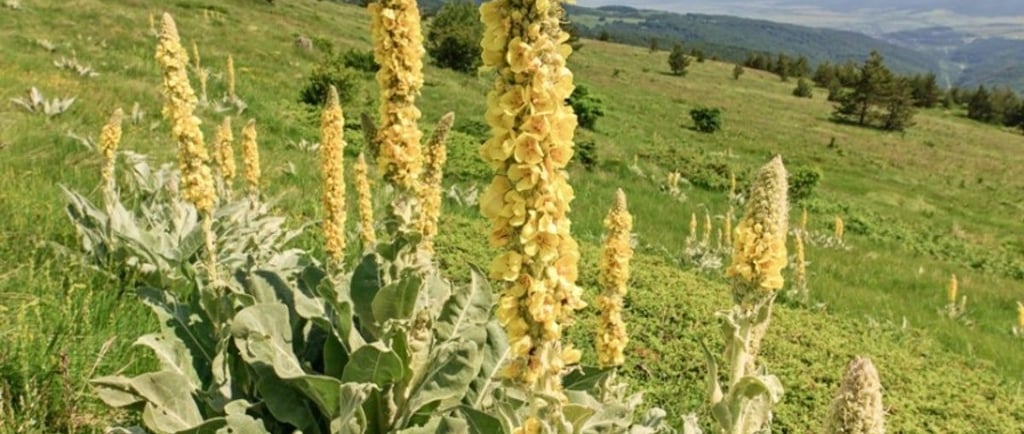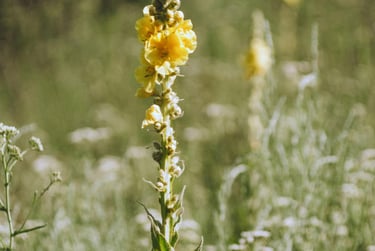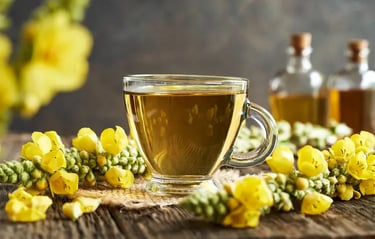Herbal Backer News & Updates: FLASH SALE!!! LIMITED TIME ONLY
Unlocking the Power of Mullein: Nature's Ancient Herb for Modern Wellness
Welcome to the world of Mullein, a humble yet remarkable herb that's been cherished for centuries in traditional medicine. If you're looking for natural ways to support your health, especially when it comes to breathing easier or fighting off pesky infections, Mullein might just become your new go-to remedy.
RESPIRATORY SYSTEMCOLD AND FLUTINCTURES
10/25/20255 min read


Welcome to the world of Mullein, a humble yet remarkable herb that's been cherished for centuries in traditional medicine. If you're looking for natural ways to support your health, especially when it comes to breathing easier or fighting off pesky infections, Mullein might just become your new go-to remedy. In this blog post, we'll dive into what makes this plant so special, explore its top benefits, and share practical tips on how to use it safely. Whether you're a herbal enthusiast or just curious about nature's pharmacy, let's uncover the secrets of Mullein together!
What is Mullein? A Quick Description
Mullein (Verbascum thapsus), also known as common mullein or great mullein, is a biennial plant native to Europe, Asia, and North Africa, but now widespread in North America. It's easily recognizable by its tall, woolly stem that can reach up to 10 feet, covered in soft, fuzzy leaves that feel like flannel—earning it nicknames like "nature's toilet paper" in survival circles! In its second year, it sprouts a striking spike of bright yellow flowers. Traditionally, the leaves, flowers, and roots have been used in folk remedies, often brewed into teas or made into oils. Modern interest stems from its rich array of compounds like saponins, flavonoids, and iridoid glycosides, which contribute to its potential health perks. While scientific evidence is still emerging and mostly based on lab or animal studies, Mullein's history speaks volumes about its role in supporting overall well-being.
Top 10 Health Benefits of Mullein
Mullein has been praised in traditional medicine for a variety of uses, and emerging research is starting to back some of these up. Here's a list of the top 10 potential benefits, each with a brief description based on historical use and available studies. Remember, while promising, many benefits need more human trials for confirmation—always chat with a healthcare pro before starting any new herb.
Supports Respiratory Health: Mullein acts as an expectorant, helping to loosen mucus and soothe irritated airways. It's commonly used for coughs, bronchitis, and asthma. A review in PMC highlights its traditional role in treating pulmonary issues due to its anti-inflammatory compounds like quercetin.
Reduces Inflammation: The herb's flavonoids and saponins provide anti-inflammatory effects, potentially easing conditions like arthritis or sore throats. Studies show verbascoside from Mullein inhibits inflammatory markers in lab tests.
Fights Bacterial Infections: Mullein exhibits antibacterial properties against strains like E. coli, Staphylococcus aureus, and Klebsiella pneumoniae. Research in ScienceDirect confirms activity in extracts, supporting its use for infections.
Exhibits Antiviral Properties: Lab studies indicate Mullein can inhibit viruses like influenza A and herpes simplex. A 2023 study noted activity against these pathogens, though more research is needed.
Aids in Ear Infections: When used in ear drops (often with garlic), Mullein may reduce pain and inflammation in otitis media. A study on children found it comparable to standard treatments.
Promotes Wound Healing: Its anti-inflammatory and antimicrobial qualities help with skin wounds and burns. Traditional use includes poultices, and one study showed faster episiotomy healing in new mothers.
Provides Antioxidant Benefits: Mullein is rich in antioxidants that combat free radicals, potentially protecting cells from damage. Research links this to compounds like verbascoside.
Relieves Pain: As a mild analgesic, it may help with headaches, migraines, or joint pain. Historical texts and some studies attribute this to its sedative and anti-inflammatory effects.
Improves Digestive Health: Mullein has been used for diarrhea and gut inflammation, acting as a demulcent to soothe mucous membranes. Folk medicine supports this, with limited studies on its anti-inflammatory role in digestion.
Supports Skin Health: Topical applications may treat eczema, boils, or hemorrhoids due to its soothing properties. Antioxidants and anti-inflammatory compounds contribute here, as noted in reviews.
Mullein's Powerful Effects on Viral and Bacterial Infections
Mullein shines when it comes to combating infections, thanks to its natural antimicrobial compounds. Studies show it has antibacterial effects against a range of bacteria, including Gram-positive and Gram-negative types like Staphylococcus aureus, E. coli, and Klebsiella pneumoniae. For instance, a 2020 study demonstrated that Mullein leaf extracts inhibited these bacteria in lab settings, potentially due to saponins and flavonoids disrupting bacterial cell walls. Another research in ScienceDirect found extracts active against bovine herpes virus and slight antibacterial activity, supporting its folk use for respiratory and urinary infections.
On the antiviral front, Mullein shows promise in test-tube studies. It has been effective against influenza viruses, with one study combining it with amantadine to boost antiviral activity. Research also indicates activity against herpes simplex virus type 1 and even some strains of the herpes virus family. A 2012 study on methanolic extracts confirmed antiviral effects by interfering with viral replication. However, the claim that Mullein can "kill any virus on contact" isn't backed by science—most evidence is from in vitro (lab) experiments, not direct contact like a surface disinfectant. It doesn't universally destroy all viruses instantly; instead, its compounds may inhibit viral entry or replication inside cells. While exciting, these effects are preliminary and not a substitute for medical treatments like vaccines or antibiotics. Always consult a doctor for infections, as self-treatment can be risky
How to Take Mullein and Recommended Dosages
Mullein is versatile and can be consumed in several forms. Here's how:
Tea: Steep 1-2 teaspoons of dried leaves or flowers in hot water for 10-15 minutes. Strain well to avoid the fuzzy hairs, which can irritate the throat.
Tincture: Alcohol-based extracts for quicker absorption.
Oil: For ear drops or topical use (infuse flowers in olive oil).
Capsules or Supplements: Standardized forms for convenience.
Smoking or Vaporizing: Traditionally smoked for lung issues, but not recommended due to inhalation risks.
Dosages for Adults:
Tea: 4-8 ounces, 2-4 times daily.
Tincture: 0.8-1.3 mL (25-40 drops) 3 times daily, or up to 2 mL 3 times daily.
Classical daily dose: 3-4 grams of dried herb. Start low and increase as needed, always in water or juice.
Dosages for Children: Use with caution—limited data exists. For ear infections, a few drops of warmed Mullein oil in the ear (with cotton plug) may help, but only under medical supervision. General oral doses should be half or less of adult amounts (e.g., 0.4-0.65 mL tincture), but avoid giving to young children without a doctor's advice. Not recommended for infants.
Precautions: Mullein is generally safe, with no major side effects reported, but it may cause skin irritation if not strained properly. Avoid if pregnant or breastfeeding due to lack of safety data. It could interact with medications like diuretics or blood thinners—consult a healthcare provider.
Extra Insights to Deepen Your Understanding
To truly appreciate Mullein's potency, consider its history: Ancient Greeks like Dioscorides used it for lung ailments over 2,000 years ago, and Native Americans burned leaves for respiratory relief. Phytochemicals like verbascoside are key to its anti-inflammatory and antimicrobial punch, as shown in molecular simulations. For best results, harvest leaves before flowering or buy from reputable sources to ensure purity. If foraging, identify it correctly to avoid look-alikes. Pair it with herbs like marshmallow for enhanced soothing effects. While not a cure-all, Mullein's evidence-based potential makes it a worthy addition to your wellness routine—nature's way of reminding us that simple plants can pack a powerful punch!






